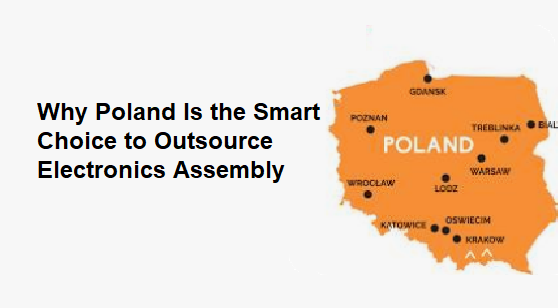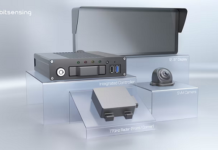
Poland has been transforming into one of Europe’s leading electronics manufacturing powerhouses, offering compelling advantages for companies seeking efficient, high- quality industrial electronics assembly. With competitive pricing, a technically skilled workforce, and a strategic location at the heart of Europe, Poland is fast becoming the preferred destination for outsourcing production that requires precision, scalability, and reliability.
Read the full article to discover the opportunities that many global electronics manufacturers (OEMs) are seizing in Poland.
Poland’s Boom in Electronics Manufacturing
The electronics industry in Poland is experiencing steady and promising growth.
Revenues are forecast to grow from €24.1 billion in 2023 to €28.5 billion by 2028, reflecting a healthy annual growth rate of 2.6%. Currently ranked fourth in Europe’s electronics market, Poland is home to over 450 electronics manufacturing businesses.
Although most available data focuses on consumer electronics, Poland also has a strong and growing presence in industrial electronics and components. The market for electronic components and printed circuit boards alone is projected to reach €4 billion by 2025, driven by a stable yet competitive environment.
Four Strategic Benefits of Manufacturing Electronics in Poland
Explore the four key strengths of Poland’s electronics manufacturing industry and how they can help OEMs stay ahead.
1. Cost Efficiency Without Sacrificing Quality
Poland’s cost structure is one of its most attractive features. With average hourly labour costs around €10.7, which is far below the EU average of €27.7 and substantially less than countries such as Germany or France, companies benefit from cost savings without compromising on quality.
Poland is the EU’s second-largest electronics producer, known for precision manufacturing and a long-standing industrial tradition. Electronics manufacturing service (EMS) providers such as Assel, based in northern Poland, exemplify this blend of affordability and excellence. With decades of experience serving international clients, Assel is a key player in the high-mix, high-complexity segment of industrial electronics assembly.
2. A Highly Skilled and Motivated Workforce
Poland produces over 15,000 technical specialists annually, driven by top-tier universities and a strong national emphasis on STEM education.
Polish engineers and operators are recognised for their technical agility, diligence, and commitment to continuous improvement. Many are already familiar with complex electronics assembly requirements, and foreign investment has further strengthened the knowledge base, bringing Polish EMS providers in line with global industry standards.
3. Strategic Location in the Heart of Europe
Situated at the crossroads of Western and Eastern Europe, Poland offers outstanding logistical advantages for manufacturers seeking proximity to major markets.
Companies in Germany, Scandinavia, and Central Europe benefit from reduced lead times and seamless cross-border operations. Locations such as Gdansk and the surrounding region, home to seasoned contract manufacturers like Assel, are particularly well-positioned, offering access to seaports, international airports, and a modern road and rail network.
This proximity, combined with cultural and time zone alignment, makes Poland an ideal nearshoring destination for European partners.
4. Advanced Manufacturing Technology and Innovation
Poland has already become a compelling alternative to traditional locations for electronics manufacturing, like Germany or China.
Polish EMS providers have embraced Industry 4.0 technologies, from automated optical and X-ray inspection to full-scale MES (Manufacturing Execution Systems), delivering precision, traceability, and process control at every production stage. Backed by EU innovation grants, favourable trade policies, and landmark investments such as the incoming Intel semiconductor facility, Poland’s electronics sector is scaling at pace.
How Poland Measures Up Globally
Meanwhile, the labour costs in Poland remain highly competitive, supported by a steady pipeline of skilled graduates. At the same time, Poland benefits from EU-level IP protection, free trade access, and tax incentives, without the geopolitical uncertainties and tariffs often associated with Asian manufacturing.
Compared to Germany, Poland offers significantly lower operational costs while still meeting stringent quality and sustainability standards. EMS providers like Assel invest continuously in automation, quality assurance, and environmental responsibility, maintaining ISO certifications and serving demanding sectors such as medical, transportation, and energy industries.
The Future of Poland’s Expanding Electronics Market
Explore the future trends and opportunities that are likely to keep on driving the dynamic growth of Poland’s electronics industry.
Market Expansion Driven by Demand and Digitalisation
Smart devices, automation, and green technology are fuelling the growth of Poland’s electronics industry. Infrastructure investments totalling €4.2 billion in digital transformation and €64 billion in energy grid upgrades will ensure stability and scalability for electronics manufacturers.
Digital Infrastructure and Energy Modernisation
Poland’s focus on 5G, cloud infrastructure, and digitalised supply chains is projected to generate €17 billion in economic benefits by 2040. Energy policy is evolving in tandem, with a national target of 50% renewable energy by 2030. This reduces operational risk and bolsters sustainability credentials for local and international manufacturers.
Leading in Green Electronics
As part of its alignment with EU environmental directives, Poland is fostering a growing green electronics market, expected to soar from USD 17.36 billion in 2023 to USD 177.01 billion by 2033. Manufacturers are increasingly adopting eco-friendly practices, including lead-free soldering, energy-efficient processes, and recyclable materials, all backed by government incentives and access to EU innovation funding.
Conclusion
Poland’s industrial electronics sector offers a strategic blend of value, quality, and future-readiness. Polish companies like Assel are experienced in high-reliability manufacturing, agile in adapting to evolving client needs, and firmly embedded in a country that values innovation, operational excellence, and long-term partnership.
For businesses seeking a stable, scalable, and sustainable partner in electronics manufacturing, Poland is not just one of the options. It is a real competitive advantage.
Article written in collaboration with https://asselems.com/















